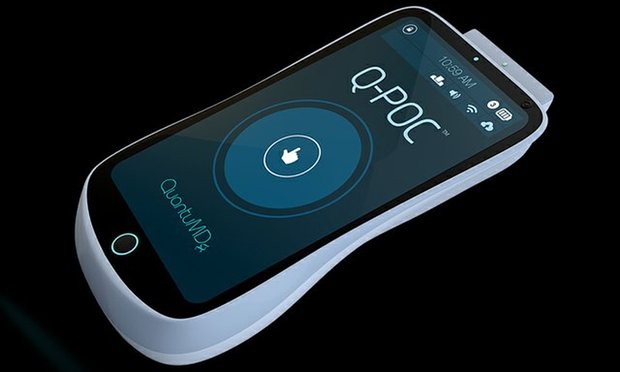From the folks at British-based technology firm QuantuMDx comes Q-poc, a smartphone-sized device billed as a “handheld lab” capable of accurately diagnosing everything from cancers to infectious diseases, and more, in just a few minutes.

At present, the device is in alpha testing, but the company hopes to roll it out to doctors by 2018.
“We’re now at the point that we have a working prototype that can perform a highly sensitive tuberculosis test from a sample through to results in 15-20 minutes,” says company co-founder Jonathan O’Halloran. “The technology is now being ramped up to beta stage and we hope to start manufacturing towards the end of this year.”
While there are a ton of questions about the accuracy of the device, its reliability, at what stages of infection it can / should be used, and more, there’s a lot to like about the technology behind it.
For one, Q-poc runs on a solar-powered battery or wind-up device. It reads biological samples submitted directly into it via a credit card-sized cartridge, and it can work with a range of sample types ranging from swabs for STDs to sputum for tuberculosis. Also, Q-poc has built-in cellphone technology, so as to allow test results to be geo-stamped and shared in real time. This is important considering the device’s potential use in third world countries—such capabilities will allow for better monitoring of disease and antimicrobial resistance.
There are already numerous other point-of-care diagnostic tools on the market; what differentiates Q-poc is that it analyzes the actual DNA of the pathogens within the samples, as opposed to the proteins. The device uses a microfluidic technology to filter fluids that pass through its microscopic channels of different diameters.
As this occurs, a chemical process breaks the sample down into somewhat of a molecular soup, which is then forced through a nanoscale-based filtration system. The filter itself is coated with a negatively charged polymer, which repels the DNA as other molecules are held back; this, in turn, isolates the DNA for a more accurate analysis.
“It sounds simple, but it is absolutely groundbreaking,” says O’Halloran, who has a background in molecular genetics. “Nothing out there on the market can come close to its speed and proficiency.”
Q-poc is still subject to regulatory approval by the World Health Organization. Assuming all goes well on that front, QuantuMDx hopes to roll the device out to doctors in South Africa, before expanding to other markets across Africa.
To help facilitate these efforts, the company has already lined up numerous nonprofits as strategic partners, including the Gates Foundation as well as the Clinton Foundation.
“When we started this, we were very clear that we wanted to address the infectious disease global health challenges and clearly these are in developing nations,” says O’Halloran; however, he doesn’t rule out the benefits of the technology in developed countries. “Let’s not forget, even [the London borough of] Tooting has a prevalence of TB [tuberculosis] higher than many parts of India.”
While the headline grabber might be an accurate cancer diagnosis in less than a half hour, Q-poc will initially be used to detect tuberculosis; tests for other diseases will be added at a later date.
In terms of cost, QuantuMDx anticipates each test will likely cost a little more than $4, and initial target figures for the device is in the neighborhood of $1,500. The company believes this will be reduced to around one-third of this price, as newer, more efficient components and solutions are incorporated.
Clinical trials of the Q-poc are planned for late 2016 in South Africa; they will be conducted in association with the University of Cape Town and the University of Stellenbosch.
“Essentially, we need to prove [to health ministries] that by using our tests, which offer benefits in terms of costs and speed, that we will be providing savings for the health care system,” O’Halloran says.
Learn more by visiting the QuantuMDx website.
Via The Guardian
Advertisement
Learn more about Electronic Products Magazine





